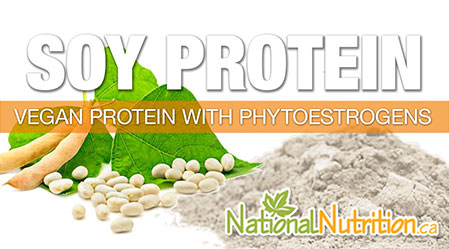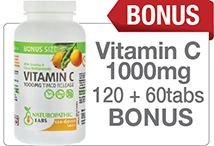
Soy provides great vegan protein and can also help with menopause due to its phytoestrogen content.
Soy Protein
Updated Mar. 09th, 2022
Soy protein is isolated from the soybean and is treated with enzymes to remove the fat and carbohydrate. Soy protein is a complete protein that provides all of the essential amino acids required by the human body. It is relatively inexpensive and is a great source of protein for vegans.
Benefits - Phytoestrogens and Menopause
Soy protein powder is quite bioavailable and has a biological value (BV) of 74. For more information on BV and the benefits of protein, please click here. Soy also contains phytoestrogens (isoflavones), which can act on human estrogen receptors to help regulate hormone effects.
When estrogen levels are too high, phytoestrogens block the receptor to produce a minimal signal. When estrogen levels are low, the phytoestrogens can gently stimulate the estrogen receptors, helping to increase hormone-specific responses. This can be beneficial in women who are going through menopause, as it can help to increase their estrogen levels and reduce symptoms.
Soy Protein Not for Body Building
Because soy protein contains phytoestrogens as explained above, it may not be the best source of protein for men seeking to gain a large amount of lean muscle mass. Muscle growth is supported by the male hormone testosterone, which competes with estrogen in the body. Introducing external estrogens, even in low doses can interfere with bodybuilding. This is generally not a problem for the average man or woman seeking a general protein supplement, as the effects are not pronounced.
Types of Soy Protein
Although all soy protein is extracted from the soybean, it is processed in different ways to create different products.
Concentrate
This form of soy protein is about 70% protein and is effectively soy flour with the fat and carbohydrates removed. This form of soy protein is generally a food additive and is not used as a protein supplement.
Isolate
Soy protein isolate is a highly refined and purified form of soy protein with a minimum protein content of 90%.
Soy Sensitivity
Unfortunately, soy is becoming a more common food sensitivity. This may be due to genetic modification (GMO), so purchasing non-GMO products may help prevent this. Signs of food sensitivity are: gas, bloating, fatigue, irritability, dark circles under the eyes, skin rashes, and bowel changes. If these symptoms occur, consider switching to an alternate protein source. For more information on alternate sources, please click here.
How can I get more soy protein?
Soy can be eaten in a number of different foods, including tofu, and tempeh. It can also be found in protein bars, drink mixes, meal replacements, weight loss formulas, or as a plain powder. The powder can be mixed with water, juice or other fluids to create a shake, or can be added to cooking or baking to increase the protein in your food. The dose of protein powder depends on the percentage of protein by weight, and the activity level and bodily requirements of the individual. People generally require 1 – 2 grams of protein for every kilogram of body weight. The lower end of this scale is for simply maintaining muscle mass with a sedentary lifestyle, while the higher end is for people looking to add significant muscle mass. For more information on protein requirements, please click here.





















